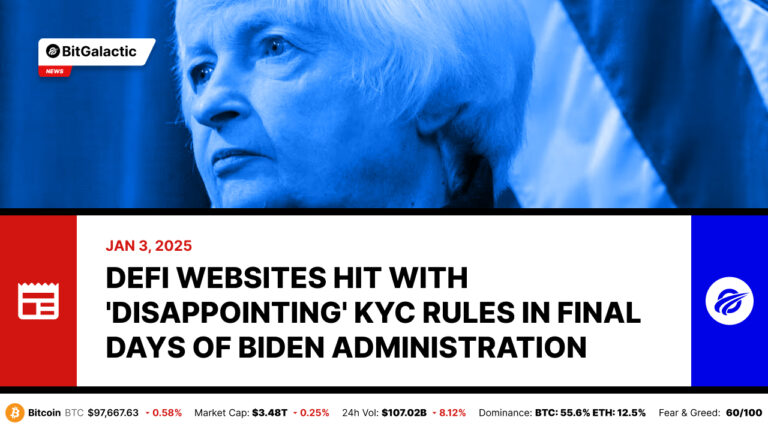DeFi Websites Hit with ‘Disappointing’ KYC Rules in Final Days of Biden Administration.
The U.S. Treasury Department announced on Friday that U.S.-based websites and crypto wallets facilitating access to decentralized finance (DeFi) must perform Know-Your-Customer (KYC) checks and track transactions starting in 2027. This move targets front-end services and wallets enabling users to interact with DeFi protocols, classifying them as “brokers” required to collect detailed customer data for tax reporting.
Despite fears that the rules could cripple the DeFi ecosystem, self-custody wallets and DeFi protocols without a swap function were spared from the broker classification. However, industry advocates and attorneys warn the regulations could push DeFi development offshore.
Kristin Smith, CEO of The Blockchain Association, criticized the timing and intent of the rule:
“Today’s broker rulemaking by the IRS and Treasury — days before the end of the year — is a disappointing, but expected, final attempt to send the American crypto industry offshore.”
Why It Matters
The DeFi space currently holds over $179 billion across thousands of protocols, driven by user-friendly platforms and wallets. While tax reporting obligations may be manageable for large financial institutions, they present existential challenges for smaller front-end providers with limited resources.
The industry’s response has been swift and vocal. Developers and advocacy groups like Coin Center are exploring legal and legislative avenues to challenge the rules, citing concerns over privacy, decentralization, and the fundamental purpose of blockchain technology.
Jason Schwartz, a tax partner at Fried Frank, acknowledges the Treasury’s effort to understand the industry but warns of severe repercussions:
“These regulations could force many front-end providers in the U.S. to close or move offshore.”
Next Steps
Critics of the rule have outlined two paths forward:
- Legal Challenges: Arguing that the Treasury overstepped its authority.
- Legislative Action: A crypto-friendly Congress could reverse the regulations.
Prominent figures like Congressman French Hill have already expressed opposition, calling the rule an overreach and urging its rescission.
BitGalactic’s Perspective
At BitGalactic, we see this as a defining moment for the future of decentralized finance. These regulations, while scaled back compared to earlier proposals, represent a critical challenge to the innovation and ideals underpinning blockchain technology. The next few years will be pivotal in determining whether the U.S. embraces or suppresses this transformative industry. For now, the battle between innovation and regulation rages on.
Share this post


